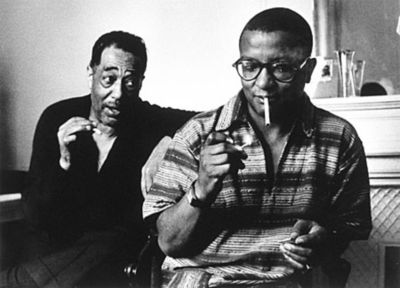The other day a generous person was telling me about transcendence – the move past anger, pain, grief, to a universal plane. The topic raised thoughts of Duke Ellington, whose 118th birthday was April 29.
In the early 1940s, Ellington wrought the long suite "Black, Brown and Beige," whose "Work Song" and "Come Sunday" remain its most enduring segments. Introducing the suite at Carnegie Hall in 1943, Ellington described the two songs' themes -- slave labor and spirituality -- as "closely related." A consideration of suffering, in other words, implies the ways people transcend pain, and Ellington went on to demonstrate some of them, including worship, song, dance and an idealistic call to arms.
Contemporary critics, complaining that Ellington somehow lacked the necessities to attempt an ambitious project such as "Black, Brown and Beige," came off as ignorant. Ellington and his right-hand orchestrator, Billy Strayhorn, in fact embodied the ideal artists to treat their complex subject matter, Ellington with his long experience as a bandleader, and Strayhorn with his deep knowledge of classical and modernist theory -- not to mention their qualifications as representatives of suffering underclasses, both being black and Strayhorn being gay.
Since Ellington strove to unite, he did not dwell on accusation. Joy and beauty dominated "Black, Brown and Beige," with the forced labor of "Work Song" painted in colors of dignity and triumph, and the desperate prayers of "Come Sunday" in colors of yearning elegance, especially via alto saxist Johnny Hodges' exquisite stretching of the "Come Sunday" melody. Musical harmony served better than words to mix diverse elements such as slaves, immigrants and overseers, and Strayhorn, as always, used the sensual palette of the Ellington orchestra to juxtapose dissonant notes in ways that thrilled rather than jarred.
Which doesn't mean the arrangements masked the underlying cultural dissonance, if you were awake to it. I even got a rude awakening one recent night. Listening on headphones to parts of "B, B & B" and other mid-'40s Ellington studio recordings, I accidentally set my overcomplicated amplifier to a "3-D" mode. The result delivered a jolt – the spacious harmonies not only got squashed like inmates in my cranial box, they got reshuffled by artificial reverberations that overhyped Strayhorn's subtle atonalities.
For a while, I got off on the violence. Then I flicked the switch and realized I was not transcending. I had been listening to manipulative technology, not to Duke; listening to anger, which I can use but don't want to keep. Listening, really, to myself.
* * *
Highly recommended on YouTube: the only complete (though not high fidelity) recording of "Black, Brown and Beige," contained within "The Duke Ellington Carnegie Hall Concerts 1943." Don't skip Ellington's circumspect yet telling verbal introductions.

